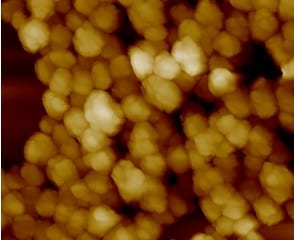 Naturally occurring nanoparticles have drawn significant interests from scientific communities, due to their unique properties and promising biocompatibility. Given the earth’s rich biological diversity, it is reasonable to believe that these nanoparticles, with various forms and functions, may be produced from a variety of organisms, ranging from microbes to metazoans.
Naturally occurring nanoparticles have drawn significant interests from scientific communities, due to their unique properties and promising biocompatibility. Given the earth’s rich biological diversity, it is reasonable to believe that these nanoparticles, with various forms and functions, may be produced from a variety of organisms, ranging from microbes to metazoans.
Dr. Yongzhong Wang and co-workers in Dr. Mingjun Zhang’s group at The University of Tennessee, Knoxville, have worked on naturally occurring nanoparticles using various microbial cultures, and discovered a novel cancer therapeutic from a surprising source: the carnivorous fungus Arthrobotrys oligospora.
This specialized fungus forms adhesive traps for capturing and digesting unlucky nematodes that cross its path. While studying the trapping mechanism, Dr. Zhang’s group created a sitting drop system to culture A. oligospora, and noticed that nanocomposites were secreted from the fungal hyphae and traps. Upon further study using advanced microscopic techniques, they discovered that these nanocomposites contained highly uniform nanoparticles. Knowing the importance of nanoparticles in cancer therapy, Dr. Zhang’s group investigated the potential capability of the fungal nanoparticles as an immunostimulatory and antitumor agent. Surprisingly, the fungal nanoparticles were able to stimulate TNF-α secretion from macrophages, and kill cancer cells in vitro.
This study by Dr. Zhang’s group has proposed a new approach for producing novel organic nanoparticles from microorganisms under controllable conditions. It may open up a new avenue for controlling the synthesis of organic nanoparticles using synthetic biology. This exciting discovery is the first step forward in the development of natural nanoparticle-based therapeutics for cancer treatment, and demonstrates the importance of looking to nature for innovation in disease treatment.

















